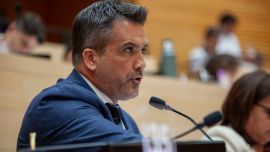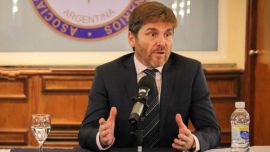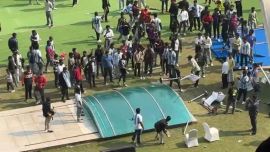Judges leading the case into the so-called 'Cuadernos' corruption notebooks case have ruled that businesspeople accused in the case can allege that under-the-table payments to Kirchnerite government officials were undeclared campaign contributions and not bribes.
The controversial resolution could turn one of the biggest corruption cases in the country into a series of electoral infractions after years of investigations and arrests.
The high-profile 'Cuadernos de las Coimas' probe focuses on alleged bribery and corruption in the awarding of public works contracts during the Kirchnerite administrations. Prosecutors claim that a total of US$160 million in bribes were handed over between 2005 and 2015.
The probe owes its name to notebooks allegedly kept by Oscar Centeno, a chauffeur who worked at the Federal Planning Ministry. According to prosecutors, business figures made illegal payments to state officials in order to win multi-billion-peso contracts for infrastructure projects.
Last week, an appeals court headed by Judges Daniel Antonio Petrone, Diego Barroetaveña and Carlos Mahiques ruled that Ángelo Calcaterra, former owner of the IESCA construction company and cousin of former president Mauricio Macri, and Javier Sánchez Caballero, his right-hand man, could put down unreported payments between 2013 and 2015 as voluntary contributions to the election campaigns of Frente para la Victoria, the party which was then in power, and not bribes to procure public works contracts.
This interpretation was initially suggested by Hugo Eurnekian, nephew of billionaire businessman Eduardo Eurnekian, during the early stages of the investigation.
Eduardo Eurnekian claimed that the payments he made were not kickbacks but campaign contributions and, therefore, they ought to be processed by electoral courts. The move was a tactic to shift the case outside of federal criminal jurisdiction
Eurnekian’s defence team at the time was headed by Mariano Cúneo Libarona, the man who now serves as Justice minister in President Javier Milei’s government
Most of the business officials accused in the probe have consistently maintained that the payments in question were made under pressure, albeit with the intention of supporting election campaigns.
Calcaterra, for instance, testified that his company took part in over 300 tenders and was successfully awarded 30 contracts, most of them on the authority of the Federal Planning Ministry, then headed by Julio De Vido and his second-in-command, Roberto Baratta.
According to Calcaterra’s version of events, it was Baratta who hinted at the need to make financial contributions to the party’s campaigns.
In court testimony, Calcaterra explained: “Baratta called me on the phone and hinted at the need to start to contribute money to election campaigns. Afterwards, he started pressuring me for it, and that’s how we ended up giving money during the election campaign, because Baratta exerted so much pressure.”
Prosecutor Fabiana León strongly objects to this interpretation of events. She argued in court that referring such cases to the electoral venue minimises the gravity of the facts and undermines the integrity of the court system.
However, León’s appeal was dismissed, and the appeals court ruled that the federal judge with electoral jurisdiction, María Servini, ought to continue the investigation on the alleged facts.
The resolution in favour of Calcaterra and other businesspeople sets a precedent which could be used by others among those accused to avoid corruption trials.
Armando Loson, another businessman involved in the case, also admitted to making payments during the 2013 and 2015 election campaigns, under the same pressure described by other businesspeople.
Loson, who owns electricity generating company Grupo Albanesi, told the court how he was pressured by Baratta into making the payments, which he delivered to garages, in instalments as he did not have all the money at one time.
Defence lawyers representing several other businesspeople, including Hugo Dragonetti and Jorge Balán, who also presented their cases as electoral infractions. The decision could lead to their cases being transferred from criminal to electoral courts, where penalties are less severe and the risk of them being time-barred is higher.
The legal row is expected to be appealed all the way to the Supreme Court.
– TIMES/NA



















Comments